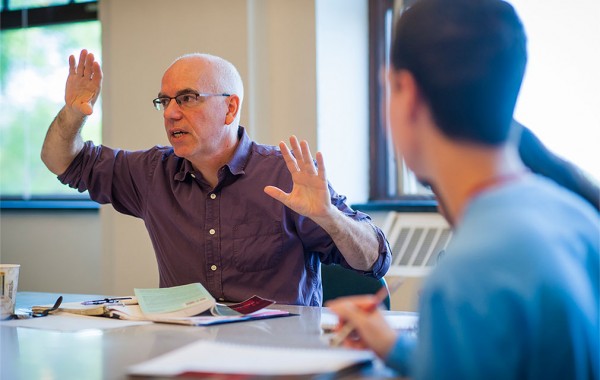
David McCabe will direct Colgate’s Division of the Arts and Humanities beginning July 1.
A longer version of this essay first ran on the Huffington Post on May 23, 2014. (Photo by Andrew Daddio)
By David McCabe, professor of philosophy
Anyone who pays attention to higher education in this country knows that teachers in the humanities feel undervalued, besieged, and at risk of becoming thoroughly marginalized. This situation must trouble anyone who sees in the humanities not just rich manifestations of the human spirit (think Plato, Shakespeare, Titian, and Toni Morrison), but also a collective body of work that can help us understand and navigate the various difficult issues we all encounter in our lives — love, death, meaning, God, evil, eternity, failure, and sacrifice, to name but a few. How, then, to persuade skeptics of the enormous value of the humanities?
I attended a recent colloquium at which one of the speakers identified three kinds of reasons we might offer to defend study in the humanities: the political, the professional, and the personal. Her three-pronged approach reflects a general trend among contemporary defenders of the humanities, and for this reason, it’s all the more important to see how those approaches, however well-intentioned, go seriously wrong.
The political defense stresses how humanistic study helps create reflective citizens who are able both to assess public policy and to attend carefully to others’ views. Even if one grants the controversial claim that the humanities do this in ways markedly superior to other fields, this seems to me a deeply wrongheaded way to defend our sustained engagement with such works as Woolf’s Mrs. Dalloway, Vermeer’s The Music Lesson, Bach’s Mass in B Minor, or Frank Lloyd Wright’s Fallingwater. We give such things our sustained and serious energies not because of something else that engagement furthers, but because of the value of experiencing the worlds those works create, the way such encounters expand, deepen, and clarify our understanding of human experience in all its challenging complexity. With all due respect to the virtues of democratic citizenship, the big issues in a human life (see above: love, death, meaning, etc.) are surely at least as important. Emphasizing the political risks shortchanges the importance of what happens in the humanities.
The professional defense, stressing how much employers value the particular skills that the humanities instill, seems to me similarly misguided. The problem is not that the claim is false: the humanities do put a premium on skills like clear writing and fluency of expression that employers will always value. The problem is that there are no successful humanists who pursued their studies for that reason. None of us started reading Beckett, or decoding Velazquez, or pondering Eliade because we thought it would help us get a job. We just thought it was worthwhile, maybe even cool, and we enjoyed ourselves. Stressing the marketability of our distinctive skills makes all of us in the humanities imposters, purveyors of bad faith, and as such, unlikely to win converts.
The personal defense, which stresses the enjoyment and fulfillment found in the humanities, comes closer to the truth. But it must be deployed carefully. In particular, it goes wrong if it suggests that our interest in some humanistic field is simply an option we choose as a matter of individual taste, along the lines of my penchant for loose-fitting sweaters or interest in South Asian cuisine. The more we defend the humanities by appealing to our own idiosyncratic interests and personalities, the harder it is to make a claim for the abiding importance of the material itself. To justify the relatively modest pay, years of solitary struggle, professional uncertainty, frequent travel from one job to another, and all the other challenges that humanist scholars willingly undertake, we have to believe that our pursuit is worthwhile not just because we like it, or because of our particular personalities, but also because such study captures something distinctly important, which any right-thinking person should be interested in as well.
Here someone will interject: “Don’t scholars in all disciplines — in the humanities, social sciences, and natural sciences — feel that way about their own field? Wouldn’t scholars across the academy make the same claim for the value of their fields of study?” My goodness, I hope so! This seems to me something to celebrate, not to apologize for or explain away. A liberal arts college should be a place where different disciplines present themselves to undergraduates in the hopes of attracting worthy disciples. This kind of spirited discussion about the importance of our various disciplines — carried on in a spirit of mutual interest, respect, and comradeship, and marked by an awareness of our own deep ignorance of other fields of study — seems to me not just an ineliminable aspect of a community of scholars, but a terrifically healthy one.
To succeed in these conditions, humanists will have to make their case with clarity, honesty, passion, self-awareness, and vigor — qualities that, I suspect, are not encouraged by defenses of the humanities that emphasize an ideal of citizenship, or the need to get a job, or the satisfaction of some particular personality quirk. Instead we must (like our colleagues outside the humanities) be candid and forthcoming about our reasons for caring so much about the work we do.






